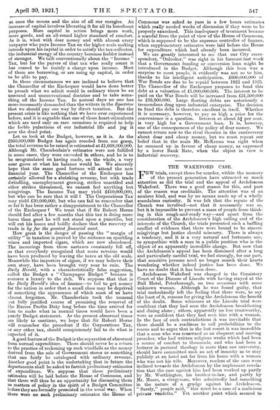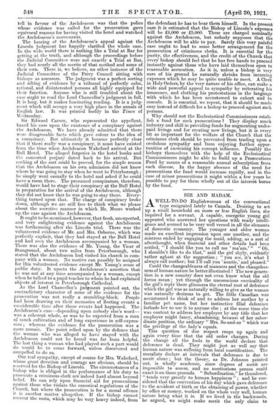THE WAKEFORD CASE. F EW trials, except those for murder, within
the memory of the present generation have attracted so much attention as did the trial and the appeal of. Archdeacon Wakeford. There was a good reason for this, and part of the reason was creditable. The attention was of an anxious kind, and was by no means made up of a wholly scandalous curiosity. It was felt that the repute of the Church was involved—not that it necessarily was so, but it is impossible to prevent a mass of people from think- ing in this rough-and-ready way—and apart from the consideration of the Archdeacon's high calling and of the interests of the Church, the trials presented such a baffling conflict of evidence that there were bound to be sincere misgivings lest justice should miscarry. There is always a tendency, and it is a very natural and fortunate one, to sympathize with a man in a public position who is the object of an apparently incredible charge. But now that the Archdeacon's appeal has been dismissed after a long and particularly careful trial, we feel strongly, for our part, that sensitive persons need no longer search their hearts wondering whether indeed justice has been done. We have no doubt that it has been done.
Archdeacon Wakeford was charged in the Consistory Court of the Diocese of Lincoln with having stayed at the Bull Hotel, Peterborough, on two occasions with some unknown woman. Although he was found guilty, that trial undoubtedly left the feeling that there were, to say the least of it, reasons for giving the Archdeacon the benefit of the doubt. Some witnesses at the Lincoln trial were confident that they had seen the Archdeacon breakfasting and dining alone ; others, apparently no less trustworthy, were as confident that they had seen him with a woman. In the face of such contradictions it was inevitable that there should be a readiness to call probabilities to the rescue and to argue that in the last resort it was incredible that a man who was renowned as an eloquent and moving preacher, who had written religious works which had been a source of comfort to thousands, and who had been a lecturer in pastoral theology in more than one university, should have committed such an act of insanity as to stay publicly at an hotel not far from his home with a woman who was not his wife. Moreover, readers of the case were inclined towards the Archdeacon by the unpleasant revela- tion that the case against him had been worked up partly by Mr. Worthington, his brother-in-law, and partly by Mr. Moore, a clergyman, who admittedly had something in the nature of a grudge against the Archdeacon. " Surely," people said, " this must be a case of a malicious private vendetta." Yet another point which seemed to tell in favour of the Archdeacon was that the police whose evidence was called for the prosecution gave equivocal reasons for having visited the hotel and watched the Archdeacon's movements.
The hearing of the Archdeacon's appeal against the Lincoln judgment has happily clarified the whole case. In the wide world there is nothing like a Trial at Bar for getting at the truth, and although the proceedings before the Judicial Committee were not exactly a Trial at Bar, they had nearly all the merits of that method and some of their own. There is, we believe, no other instance of the Judicial Committee of the Privy Council sitting with bishops as assessors. The judgment was a perfect sorting and sifting of evidence by a tribunal of perfectly calm, rational, and disinterested persons all highly equipped for their function. Anyone who is still troubled about the case ought to read the Lord Chancellor's judgment in full. It is long, but it makes fascinating reading. It is a judg- ment which will occupy a very high place in the annals of English law. It was printed bodily in the Times of Wednesday. Sir Edward Carson, who represented the appellant, based his case upon the existence of a conspiracy against the Archdeacon. We have already admitted that there were disagreeable facts which gave colour to the idea of a conspiracy. But ultimately it became perfectly clear that if there really was a conspiracy, it must have existed from the time when Archdeacon Wakeford arrived at the Bull Hotel. The alleged forgeries in the hotel books and the concerted perjury dated back to his arrival. But nothing of the sort could be proved, for the simple reason that the Archdeacon on his own admission did not know where he was going to stay when he went to Peterborough ; he simply went casually to the hotel and asked if he could have a room there. The presumed conspirators, therefore, would have had to stage their conspiracy at the Bull Hotel in preparation for the arrival of the Archdeacon, although they did not know that he was going to stay there. Every- thing turned upon that. The charge of conspiracy broke down, although we are still free to think what we please about the secretive manner in which Mr. Moore worked up.the case against the Archdeacon. It ought to be mentioned, however, that fresh, unexpected, and very enlightening evidence against the Archdeacon was forthcoming after the Lincoln trial. There was the volunteered evidence of Mr. and Mrs. Osborne, which was perfectly explicit, that they had stayed at the Bull Hotel and had seen the Archdeacon accompanied by a woman. There was also the evidence of Mr. Young, the Vicar of Stanground, about two miles from Peterborough, who stated that the Archdeacon had visited his church in com- pany with a woman. No motive can possibly be assigned for this volunteered evidence' except Mr. Young's sense of public duty. It upsets the Archdeacon's assertion that he was not at any time accompanied by a woman, except when he talked to a pupil teacher to whom he had explained objects of interest in Peterborough Cathedral.
As the Lord Chancellor's judgment pointed out, the contradictory character of some of the evidence for the prosecution was not really a stumbling-block. People had been drawing on their memories of °fleeting events a considerable time after those events had happened. The Archdeacon's case—depending upon nobody else's word— was a coherent whole, as was to be expected from a man of much cultivation and of long experience in self-expres- sion ; whereas the evidence for the prosecution was a mere mosaic. The point relied upon by the defence that the woman who was alleged to have stayed with the Archdeacon could not be found was far from helpful. The last thing a woman who had played such a part would do would be to come forward, unless discovered and compelled to do so.
Our real sympathy, except of course for Mrs. Wakeford, whose great devotion and courage are obvious, should be reserved for the Bishop of Lincoln. The circumstances of a bishop who is obliged in the performance of his duty to prosecute a criminous clerk are indeed hard almost beyond belief. He can rely upon financial aid for prosecutions against those who violate the canonical regulations of the Church, but where the prosecution is for a moral offence it is another matter altogether. If the bishop cannot recover the costs, which may be very heavy indeed, from the defendant he has to bear them himself. In the present case it is estimated that the Bishop of Lincoln's expenses will be £4,000 or £5,000. These are charged nominally against the Archdeacon, but nobody supposes that the Archdeacon will be able to pay. Surely this very painful case ought to lead to some better arrangement for the prosecution of criminous clerks. It is essential for the purity, the effectiveness, and the credit of the Church that every bishop should feel that he has free hands to proceed instantly against those who have laid themselves open to reasonable accusation. As it is, unless a bishop is very sure of his ground he naturally shrinks from incurring expenses which he may be quite unable to meet. A Clerk in Holy Orders, by the very nature of his office, can make a wide and powerful appeal to sympathy by reiterating his innocence, and clothing his protestations in the language with which he has been accustomed to exhort and to console. It is essential, we repeat, that it should be made easy instead of difficult for a bishop to proceed against such persons.
Why should not the Ecclesiastical Commissioners estab- lish a fund for such prosecutions ? They display much industry and skill in providing funds for augmenting under- paid livings and for creating new livings, but it is every bit as important for the welfare of the Church that the criminous clerk should be prevented from trading upon a credulous sympathy and from enjoying further oppor- tunities of exercising his corrupt influence. Possibly the bishops themselves' with the help of the Ecclesiastical Commissioners might be able to build up a Prosecutions Fund by means of a reasonable annual subscription from each diocese. In the happy absence of the need for prosecutions the fund would increase rapidly, and in the case of minor prosecutions it might within a few years be possible to pay for them wholly out of the interest borne by the fund.



































 Previous page
Previous page